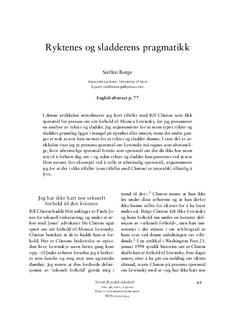| dc.contributor.author | Borge, Steffen | |
| dc.date.accessioned | 2017-10-24T08:25:41Z | |
| dc.date.available | 2017-10-24T08:25:41Z | |
| dc.date.created | 2011-09-21T13:36:14Z | |
| dc.date.issued | 2011 | |
| dc.identifier.citation | Norsk Filosofisk Tidsskrift. 2011, 46 (1), 49-61. | nb_NO |
| dc.identifier.issn | 0029-1943 | |
| dc.identifier.uri | http://hdl.handle.net/11250/2461620 | |
| dc.description.abstract | In this paper I address the topics of the pragmatics of rumours and gossip, on the one hand, and the question of unwarranted questions, on the other. I briefly introduce the case of Bill Clinton who got asked by the press about his relationship with Monica Lewinsky, before I turn to an analysis of rumours and gossip. Sometimes lack of openness gives rise to rumours and gossip, while other times it is enough that something is mentioned for it to give rise to rumours and gossip. In the last part of the paper I show that the press s questions about Monica Lewinsky were unwarranted, unwarranted questions understood as questions about topics you are not in a position to inquire about. I argue that since merely mentioning something can give rise to rumours and gossip, for example by asking a unwarranted question, and the questions about Lewinsky were unwarranted, it would have been (morally) permissible for Clinton to lie to the press regarding his affair with Monica Lewinsky. | nb_NO |
| dc.description.abstract | I denne artikkelen introduserer jeg kort tilfellet med Bill Clinton som fikk spørsmål fra pressen om sitt forhold til Monica Lewinsky, før jeg presenterer en analyse av rykter og sladder. Jeg argumenterer for at noen typer rykter og sladders grunnlag ligger i mangel på åpenhet eller innsyn, mens det andre ganger er nok at noe bare nevnes for at rykter og sladder dannes. I siste del av artikkelen viser jeg at pressens spørsmål om Lewinsky må regnes som ubetimelige, hvor ubetimelige spørsmål forstås som spørsmål om det du ikke har noen rett til å forhøre deg om – og siden rykter og sladder kan genereres ved at noe blott nevnes (for eksempel ved å stille et ubetimelig spørsmål), argumenterer jeg for at det i slike tilfeller (som tilfellet med Clinton) er (moralsk) tillatelig å lyve. | nb_NO |
| dc.language.iso | nob | nb_NO |
| dc.publisher | Universitetsforlaget | nb_NO |
| dc.rights | Navngivelse-Ikkekommersiell 4.0 Internasjonal | * |
| dc.rights.uri | http://creativecommons.org/licenses/by-nc/4.0/deed.no | * |
| dc.title | Ryktenes og sladderens pragmatikk | nb_NO |
| dc.type | Journal article | nb_NO |
| dc.type | Peer reviewed | nb_NO |
| dc.description.version | publishedVersion | nb_NO |
| dc.source.pagenumber | 49-61 | nb_NO |
| dc.source.volume | 46 | nb_NO |
| dc.source.journal | Norsk Filosofisk Tidsskrift | nb_NO |
| dc.source.issue | 1 | nb_NO |
| dc.identifier.doi | 10.18261/issn.1504-2901 | |
| dc.identifier.cristin | 840814 | |
| dc.relation.project | Norges forskningsråd: 212841 | nb_NO |
| dc.description.localcode | © 2011 Universitetsforlaget. This is an open access article under the CC BY-NC 4.0 license (https://creativecommons.org/licenses/by-nc/4.0/) | nb_NO |
| cristin.unitcode | 194,62,70,0 | |
| cristin.unitname | Institutt for filosofi og religionsvitenskap | |
| cristin.ispublished | true | |
| cristin.fulltext | original | |
| cristin.qualitycode | 1 | |

